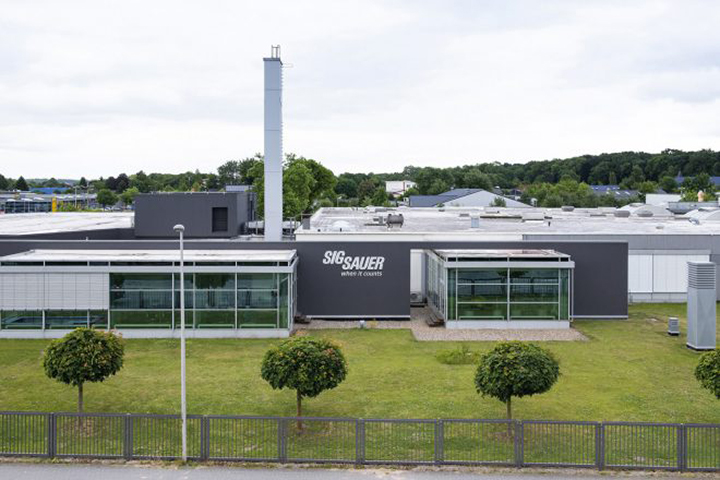SIG Sauer is Not Bankrupt
June 5, 2020There are a number of outlets that are claiming SIG Sauer is bankrupt, which couldn’t be further from the truth. SIG Sauer is a booming business across the world.
Sales of personal firearms have increased sharply as international economic uncertainty due to COVID-19 restrictions and violent protests in the U.S. continue.
Despite growing sales and demand for manufacturing, SIG announced it will shutter its nearly 70-year-old factory at Eckernförde near Kiel, capital of Germany’s state of Schleswig-Holstein, cutting some 125 jobs and possibly canceling future purchase orders.
SIG attributed “locational handicaps” for its production woes in Germany. But the more we dig into the matter; the more anti-gun and anti-military politics appear to be at fault, even though Germany remains a hot market for gun sales.
BACKGROUND
SIG Sauer has famously supplied police forces across Germany with its P-series sidearms and has more recently become a major client for the German military, the Bundeswehr. But according to SIG, its historically close relationship with German forces is now in jeopardy. SIG said in a statement that, “When awarding public contracts, both the German police and the Bundeswehr prefer a few local producers. SIG Suer is systematically excluded from tenders due to its international orientation, most of its developments [manufacturing] originating from the USA.”
German public broadcasting network NDR reports that while most of SIG’s production is developed in the United States, but the German plant is a crown jewel for the company, due to its German/Swiss heritage. In 1990, the company built a large facility on a former U.S. Air Force Base in Newington, New Hampshire. The U.S. production unit employs 2,300 people in nine facilities. On June 1, SIG announced it will provide the U.S. Army with a line of “next-generation” machine guns and “greater penetration” ammunition.
INTERNATIONAL SUCCESS STORIES NEED NOT APPLY
In April of this year, Kiel state prosecutors began digging into claims that SIG’s U.S. branch was exporting firearms to Colombia and Mexico without the required German government export paperwork, and threatened CEOs with jail time.
“It doesn’t seem to bother the Federal government that every 14 minutes around the world a person is killed by a German weapon,” said the German Left Party’s Sevim Dagdelen in 2019, referencing the investigation.
SIG’s rivals were included in the chorus of opposition, including Heckler & Koch and Walther, after a February 2019 mass shooting in which a shooter used Ceska, Walther, and SIG handguns in his murder-suicide spree.
A continuing media narrative concerning the “world’s deadliest gun manufacturers” provided kindling for the fire. German politicians pressured the military and local law enforcement to prefer smaller, local manufacturers that can more easily be controlled and prevented from selling arms internationally. SIG Sauer said in a press release that “Legislation is increasingly restricting the use of sports firearms.”
The statement added that SIG’s shareholders have made major financial contributions to stabilize the company, and SIG has implemented drastic cost-cutting measures, all of these taken to secure the Germany-based location and local jobs. SIG’s statement concluded:
“In addition to the existing problems, there are the current effects of the Corona[virus] crisis, which place an additional economic burden on the continuation of business operations in Eckernförde.”
ANALYSIS
Aside from the press release, SIG and its owners have been relatively silent about the political pressures they’re under. This may be for a reason.
According to shooting enthusiasts blog All4Shooters, SIG owner Michael Lüke‘s prospects of doing major business in Germany is now greatly diminished, aside from maintaining existing products:
“SIG Sauer will probably not continue to operate in Isny [in south-eastern Baden-Württemberg, Germany] either – i.e. at the Blaser Group’s location. It can be assumed that the plant closure could already be completed in the period from September to December 2020. However, the spare parts supply for SIG Sauer etc. will continue.”
That does seem to be the case on the surface. But the fact remains that the company did not shutter German production immediately. As All4Shooters noted, SIG had plans to restructure its internal operations before announcing the closure.
The Bundestag parliament has two weeks in June and early July before a summer recess through September. The timing here could give the company enough room to lobby parliament to preserve at least its longstanding arrangement with law enforcement (though SIG’s status as a military arms manufacturer is a much newer development). The timing may also give SIG an opportunity to test the political winds before charting a new course forward.
Win or lose in the Bundestag; SIG does business in 88 countries according to its website. Making an example out of Germany’s intransigence will not radically subtract from their bottom-line. The closure may rescue other firearms manufacturers, drawing public sympathy as a beloved German brand shutter what is arguably its most recognizable factory there.
But SIG is not done with Germany, not by a long shot. Germany maintains a stealthily large hunting and sport shooting population, even with stiff government licensing fees.
According to another press release from L&O Holding group, which owns SIG’s German division, their international sales team (based in Europe) “will expand its responsibilities to include the German market.”
Furthermore, German Sports Group (GSG), the current commercial distributor in Germany for SIG scopes, ammunition, and air guns, “will expand its role to include commercial firearm sales in Germany.”
If SIG cannot navigate parliament in the upcoming months, it’s a big enough ship to where it can simply trim sails to accommodate for increased headwinds.
Andy Hogue is a longtime veteran of legislative politics and journalism. He makes frequent appearances on television and radio shows in the Austin area, his writing has appeared in numerous national and international media outlets. He has served as speechwriter for two state officials, publicity director for several projects at The Alamo, and was constituent services director for one of the last conservative Austin City Councilmen. For fun he likes to unload 13 rounds from his Browning Hi-Power.


